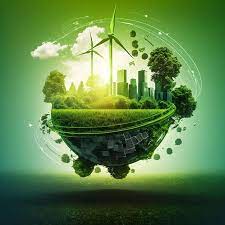
Green Energy

30-10-2023
Green Energy
|
For Prelims: Green Energy, Green Energy vs Renewable Energy For mains GS paper 3: Forms of Green Energy (Solar energy, wind power, Hydropower Biomass, Geothermal, benefits of green energy, Advantages of Green Energy |
Why in the news?
The Ministry of Coal and the Ministry of New & Renewable Energy decided to work together for the promotion of green energy.
Green energy
- Green energy is any energy type that is generated from natural resources, such as sunlight, wind, or water.
Green Energy vs Renewable Energy
- Green Energy often comes from renewable energy sources although there are some differences between renewable and green energy.
- Renewable energy comes from sources that are constantly and naturally renewed, such as wind power and solar power. Renewable energy is also often called sustainable energy.
- A renewable energy source may not be considered ‘green’ if, for example, some carbon emissions are associated with the processes used to generate the energy – such as the building of infrastructure
Forms of Green Energy
The main sources are wind energy, solar power, and hydroelectric power (including tidal energy, which uses ocean energy from the tides in the sea).
The six most common forms of green energy
Solar energy: Solar panels use silicone sheets with energy-absorbing cells to convert sunlight into electricity. Solar power is a relatively accessible resource, and people can harness solar power industrially or individually by installing solar panels on buildings and homes.
Wind power: Wind turbines generate kinetic energy that we then use to create electricity. The harnessing of wind power doesn't require much human labour, and it is known as one of the most environmentally friendly resources.
Hydropower: Hydropower plants capture kinetic energy from the currents flowing in streams and rivers. This is done through the use of a turbine built into a dam.
Biomass: Energy can be generated from agricultural, urban, and industrial waste. Biomass can be harnessed by burning wood and energy crops grown specifically for this purpose. Wheat, sugar beet, sugar cane, and maize are often fermented to produce bioethanol.
Geothermal: The heat held within the fluids and rocks beneath the Earth's crust can create energy. To harness geothermal energy from the steam and hot water, workers dig mile-deep wells into underground reservoirs. They then use this steam and hot water to power turbines connected to electricity generators.
The benefits of Green Energy
- For many people and organizations, green energy's main draw is that it's less harmful to the environment. Green energy sources like wind and solar power are superior options for avoiding harmful greenhouse gas emissions. While installing wind turbines on homes may not be possible, we can choose utility providers that supply green energy.
- Green energy is also better for our physical health as it is far less responsible for polluting our air and water.
- According to the World Health Organization, household and ambient air pollution causes 4.2 million deaths around the world annually.
- Most of these deaths occurred in low- to middle‐income countries, especially Southeast Asia and the Western Pacific regions.
- For this reason, we must focus more on renewable energy sources that cause less damage than their unsustainable counterparts, especially in less affluent countries.
- Green energy sources like wind energy and solar power are far more sustainable options compared to fossil fuels. They offset the emissions of oxide, nitrogen dioxide, and sulfur dioxide, saving substantial health issues.
- Another advantage of green energy is that the naturally occurring resources used to harness it will not deplete over time.
Advantages of Green Energy
- Clean energy
- Inexhaustible energy source
- No carbon emissions of greenhouse gases
- Energy independence
- Self-sufficient
- Sustainability
- Environmentally friendly and slows down climate change.
- In addition to contributing to the protection of the environment, using green electricity and green gas can also help you make savings on your bills.
Source: Times of India